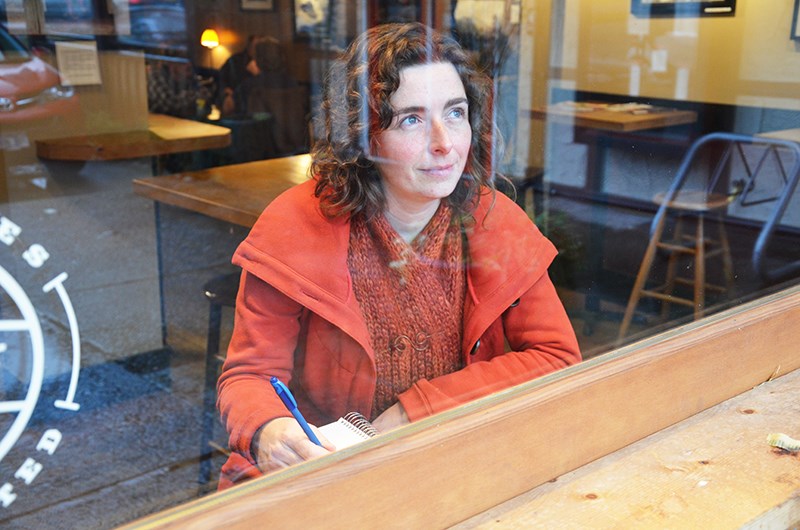People we pass every day
become our landscape,
and we theirs.
– Excerpt from a poem by Bren Simmers
��
Bren Simmers notices the small things, like the old man who does three turns of Pandora Park every morning.
There was an unspoken acknowledgement of each other between them; he as he shuffled along the sidewalk, she as she sat behind her desk in pajamas. Together they played a part in the neighbourhood’s character.
“It started out as this idea of how do I pay attention to my life,” Simmers says, as she settles into a chair at the Bean Around the World Café in Brackendale, near her townhouse.��
Five years ago, Simmers decided to write a book of poems that mapped out the neighbourhood where she lived in East Vancouver. The pocket community was changing, gentrifying as the money of Vancouver’s heart began to sprawl. Simmers, like many of the 30-somethings in the city, was frustrated. Soaring real estate and rental prices led her to question how one makes a home and what that means. “For me it is family, community and the neighbourhood walks that we do,” she says. “It is also about the people you see every day.”
While compiling the book, Simmers took daily notes on the neighbourhood’s details – what month chalk drawings first appeared on the sidewalks, when front doors were left open in the summer and how many of them were attended, and the first time she was able to comfortably wear short sleeves at midnight.��
Simmers has trained her eyes to notice such details. One could say it was a component of her work as a park interpreter for Metro Vancouver, a job that required her to highlight the special natural and cultural features and ecological relationships in regional parks.
Or her heightened awareness of her surroundings may have been a gift from her father. Simmers grew up in a house filled with literature. She was encouraged to write, imagine and observe. Her father, Neil, wrote poems for journals published across North America.
The wall of the one-bedroom apartment Simmers shared with her husband soon after their marriage became a testament to her observations and poems. Papers dotted the free space, taking form like a game of Tetris. Space was on Simmers’s mind, not only in her book but her life. Her husband, Adam Hill, is a musician. Musical instruments filled every corner, as Simmer eked a writing area into the living room.
Two years ago, as Simmers wrapped up work on her book, the couple moved to ������Ƶapp– partly because of affordability and partly because of their love for the outdoors. The new community and townhouse gave her the space she craved. She was able to see her work as a whole, separated from the neighbourhood on which it focused.��
In the spring of 2015, the book, Hastings-Sunrise, was complete. Simmers had whittled 80 pages down to 60. The end result was a literary work that earned her a spot as a finalist for the 2015 City of Vancouver Book Award.��
“This one I took my time with,” Simmers says of the book, noting it’s nice when poetry is recognized.
The interview is briefly interrupted as she acknowledges a friend at the café. Asked what Simmers is being interviewed about, she replies, “It is my secret other life.”
When Simmers is not writing, she works as the program supervisor at Cheakamus Centre, formerly known as the North Vancouver Outdoor School.��
As a poet, Simmers is a rarity, although poetry is all around us, she quickly points out. It’s in the pop and hip-hop songs that blast over the radio, it can be heard at slam poetry events in small cafés and it’s recited at most big occasions in our lives – birthdays, weddings and funerals.��
The problem is it is often not taught or displayed in a fashion that makes the younger generation think poetry is relevant today, Simmers says. But if you are willing to explore the current world of poetry, what you’ll find is a vibrant and exciting environment, Simmers says. Poetry’s only limit is the imagination.
��“I guess what I love about poetry is it is a compression of expression and emotion.”




